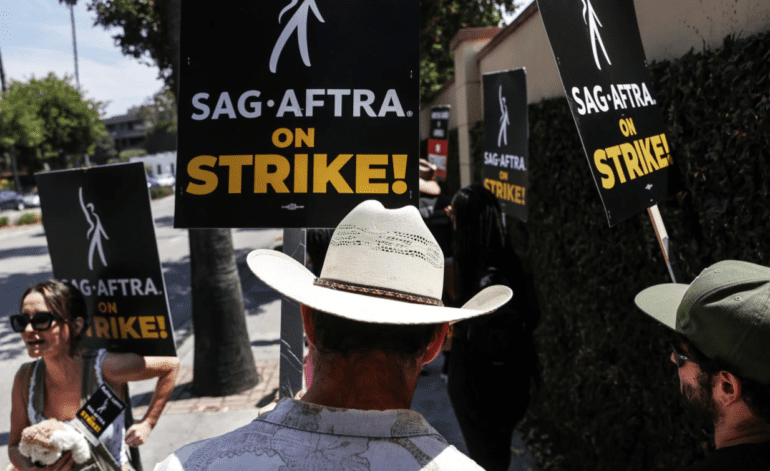TL;DR:
- SAG-AFTRA, representing 150,000+ performers, announces a pioneering deal with Replica Studios for AI voice integration in video games.
- The agreement sets strict terms for digitally replicated voices, ensuring consent and protecting performers’ rights.
- Replica Studios gains the ability to license AI voices for video game development and multimedia projects.
- This development follows SAG-AFTRA’s recent contract negotiations and a strike authorization by video game voice actors.
- The CEO of Replica Studios emphasizes ethical AI voice practices, differentiating from unethical data-scraping methods.
- Concerns continue over AI’s role in creative industries, with recent legal battles in AI-generated art and copyright infringement cases.
- Duncan Crabtree-Ireland, SAG-AFTRA’s National Executive Director, stresses the importance of consent for performers.
- Social media reactions to the announcement are mixed, with some expressing confusion and frustration.
Main AI News:
In a significant development for the entertainment world, SAG-AFTRA, the formidable union representing over 150,000 film and television performers, has unveiled a groundbreaking deal that paves the way for the integration of artificial intelligence voices in video games.
This transformative agreement, inked in partnership with Replica Studios, a trailblazing AI voice technology company, introduces robust safeguards governing the licensing of digitally replicated voices. The union, in its official statement, underlines the deal’s commitment to setting minimum terms and conditions, with a paramount requirement for obtaining explicit consent before deploying replicated voices. Additionally, the agreement empowers performers to exercise their discretion, enabling them to decline the continuous use of their voices in forthcoming projects. This momentous partnership endows Replica Studios with the capacity to license AI voices for the dynamic landscape of video game development and other multimedia ventures.
The inception of generative AI into the mainstream in 2022 sent shockwaves across various industries, ushering in a new era of possibilities, especially within the realms of entertainment and creative expression.
Notably, SAG-AFTRA’s recent contract negotiations with major film and TV studios, which received ratification last month, have further underscored the need for obtaining actors’ consent and ensuring appropriate compensation when replicating their likenesses with AI technology. This development comes on the heels of a pivotal vote by video game voice actors and motion capture performers, who, back in September, authorized a strike in the event of failed negotiations regarding a new labor contract.
Duncan Crabtree-Ireland, the National Executive Director of SAG-AFTRA, expressed his conviction that the partnership with Replica Studios will instill a renewed sense of trust among actors working in the video game industry, marking a significant advancement for all performers. He emphasized, “What’s truly significant about this agreement is that it offers protection to performers across the entire spectrum of the industry. Often, it’s the lesser-known performers who require this protection even more, as they may not possess the bargaining power to negotiate such terms individually.“
Addressing the unique scenario of utilizing the voices of deceased performers, Crabtree-Ireland noted that posthumous agreements could be brokered with the consent of the designated representatives of the estate.
Shreyas Nivas, CEO of Replica Studios, expressed enthusiasm for the transformative possibilities this partnership unlocks for video game studios. He underscored the importance of their voice actor agreements, ensuring that game developers utilizing their platform exclusively access licensed talent who has granted explicit permission for their voices to be utilized as training data sets. Nivas contrasted this ethical approach with other AI platforms that employ questionable data-scraping techniques to replicate and synthesize voices without proper authorization.
The discussion surrounding the future of generative AI, particularly its potential to replace labor, was a central point of contention during last year’s Hollywood strikes. Within the creative industries, concerns persist regarding companies leveraging AI technology to replicate human creative output.
In a recent legal development, a group of artists initiated an amended copyright lawsuit against companies specializing in AI-generated art, revealing unsettling practices in the industry. OpenAI and Microsoft have also faced copyright infringement suits, including a high-profile case brought forth by The New York Times.
Duncan Crabtree-Ireland emphasized that the core issue lies in consent. Some members of SAG-AFTRA have experienced what he termed as “mistreatment” by companies that have utilized their likenesses or performances without proper authorization. Partnerships like the one forged with Replica Studios are aimed at restoring trust and confidence among union members. Crabtree-Ireland added, “AI tools can also be beneficial. We’re not turning our back on AI; instead, we plan to leverage it to ensure the commitments made in our contracts to our members are rigorously upheld.”
While this milestone agreement promises a new era for AI voices in video games, reactions on social media have been mixed, with some expressing both confusion and frustration in response to SAG-AFTRA’s announcement on Instagram.
Conclusion:
This groundbreaking agreement between SAG-AFTRA and Replica Studios marks a significant step towards integrating AI voices into the gaming industry while safeguarding performers’ rights and consent. It not only addresses ethical concerns but also sets a precedent for the responsible use of AI technology in creative fields. The market can anticipate increased transparency and ethical practices in AI voice integration, fostering trust among performers and stakeholders in the entertainment industry.

